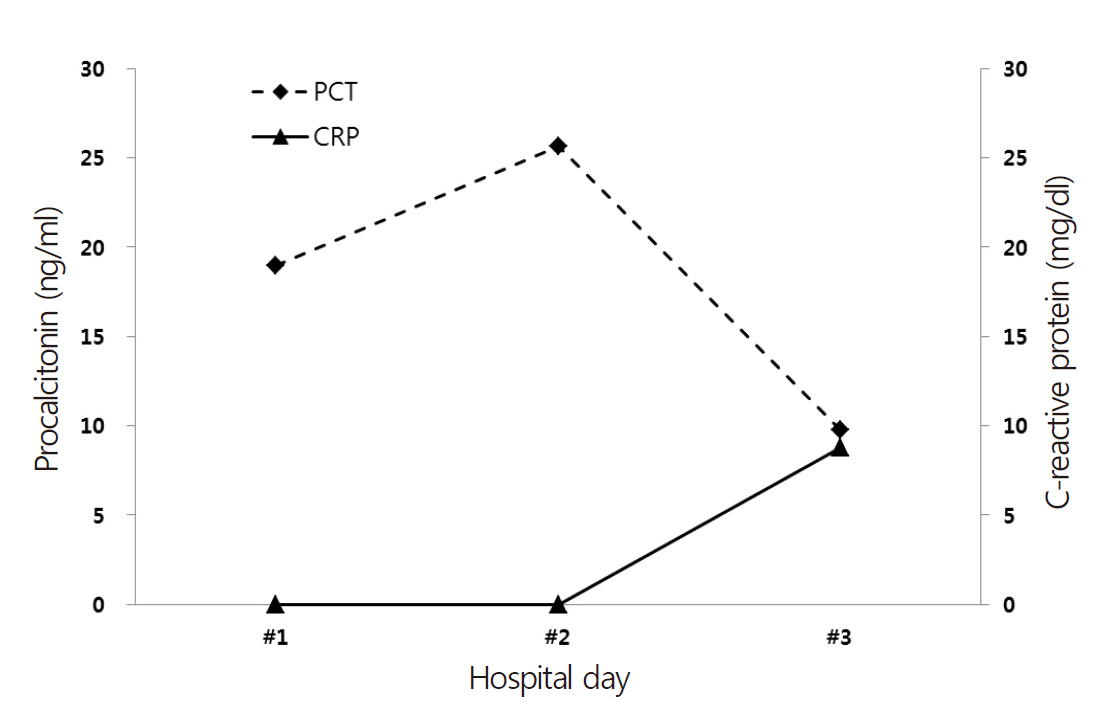Korean J Crit Care Med.
2017 Nov;32(4):359-362. 10.4266/kjccm.2016.00087.
Malignant Syndrome in Parkinson Disease Similar to Severe Infection
- Affiliations
-
- 1Department of Emergency Medicine, Chonnam University Hospital, Chonnam National University Medical School, Gwangju, Korea. emdrmjm@gmail.com
- KMID: 2405123
- DOI: http://doi.org/10.4266/kjccm.2016.00087
Abstract
- A 70-year-old woman with Parkinson disease was admitted to the emergency department with altered consciousness, fever and convulsive movements without experiencing withdrawal from antiparkinsonian medication. Six hours after the emergency department visit, the patient had a hyperpyrexia (>40℃) and a systolic blood pressure of 40 mmHg. There was no evidence of bacterial infection based on extensive workups. The patient was discharged without aggravation of Parkinson disease symptoms after treatment that included administration of dantrolene sodium, enforcement of continuous renal replacement therapy and cooling blankets. Malignant syndrome should be suspected if high fever occurs in Parkinson disease patients without evidence of a definitive infection.
Keyword
MeSH Terms
Figure
Reference
-
References
1. Takubo H, Harada T, Hashimoto T, Inaba Y, Kanazawa I, Kuno S, et al. A collaborative study on the malignant syndrome in Parkinson’s disease and related disorders. Parkinsonism Relat Disord. 2003; 9 Suppl 1:S31–41.
Article2. Levenson JL. Neuroleptic malignant syndrome. Am J Psychiatry. 1985; 142:1137–45.3. Mizuno Y, Takubo H, Mizuta E, Kuno S. Malignant syndrome in Parkinson’s disease: concept and review of the literature. Parkinsonism Relat Disord. 2003; 9 Suppl 1:S3–9.
Article4. Chandran CJ. Malignant syndrome in Parkinson disease without dopaminergic drug withdrawal. Ann Indian Acad Neurol. 2008; 11:248–50.5. Sechi G, Manca S, Deiana GA, Corda DG, Pisu A, Rosati G. Acute hyponatremia and neuroleptic malignant syndrome in Parkinson disease. Prog Neuropsychopharmacol Biol Psychiatry. 1996; 20:533–42.6. Cao L, Latz RH. Acute hypernatremia and neuroleptic malignant syndrome in Parkinson disease. Am J Med Sci. 1999; 318:67–8.
Article7. Broman M, Islander G, Müller CR. Malignant hyperthermia, a Scandinavian update. Acta Anaesthesiol Scand. 2015; 59:951–61.
Article8. Becker KL, Snider R, Nylen ES. Procalcitonin assay in systemic inflammation, infection, and sepsis: clinical utility and limitations. Crit Care Med. 2008; 36:941–52.
Article9. Lovas A, Agoston Z, Késmárky K, Hankovszky P, Molnár Z. Extreme procalcitonin elevation without proven bacterial infection related to amphetamine abuse. Case Rep Crit Care. 2014; 2014:179313.
Article
- Full Text Links
- Actions
-
Cited
- CITED
-
- Close
- Share
- Similar articles
-
- A Case mimicking Neuroleptic Malignant Syndrome associated with Levodopa Withdrawal in Parkinson's Disease
- Electroconvulsive Therapy for Parkinson’s Disease with Depression and Neuroleptic Malignant Syndrome: A Case Report
- Rasagiline Induced Drug Rash with Eosinophilia and Systemic Symptoms Syndrome: A Case Report
- Pisa Syndrome in Parkinson's Disease With a Good Response to Dopamine Therapy
- A Patient with Recurrent Dyskinesia and Hyperpyrexia Syndrome


